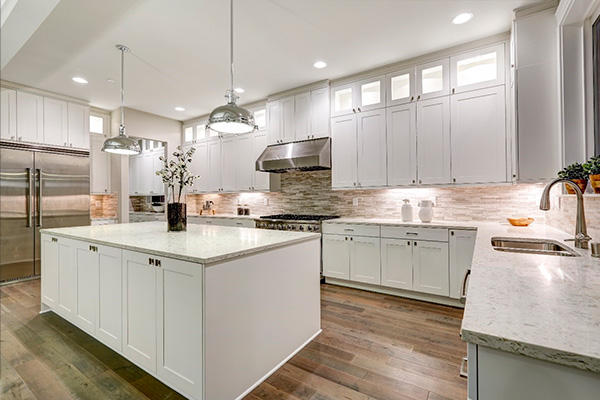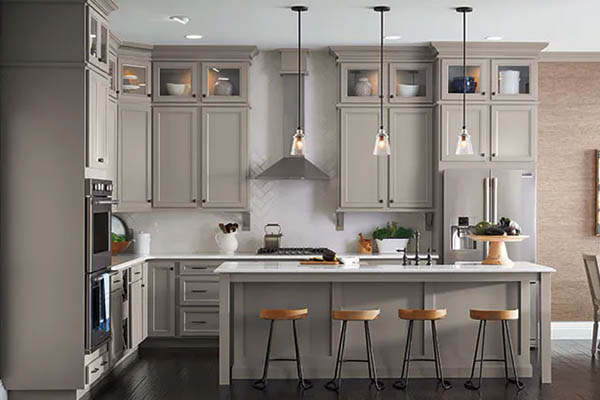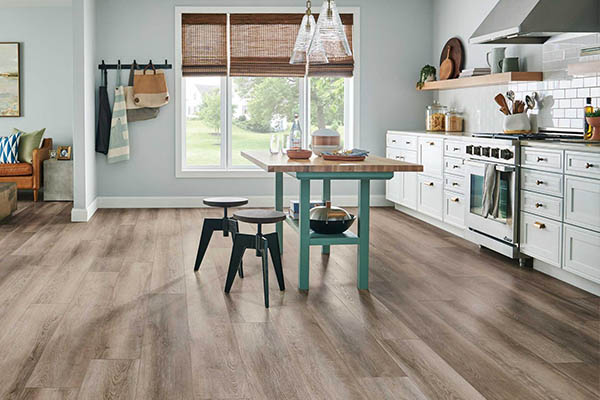Flooring material selection guide

The flooring you choose can set the tone for the entire room and can profoundly impact how you feel in that space.
Feeling pressure to make the right decision is natural, but the process can be enjoyable with the proper guidance and expertise.
Choosing a suitable floor material is an essential part of any remodeling project.
Here are some popular flooring materials and their characteristics to help you with floor material selection:
Hardwood flooring:
A classic and timeless natural wood floor option available in many different species, colors, and finishes. It's a durable and natural material that can last decades with proper maintenance.
Pros: natural wood increases home value, is aesthetically pleasing, long-lasting, and easy to clean, and as a natural wood, it can be sanded and refinished. Given proper care, it can last for decades.
Cons: relatively high cost, can be scratched or dented easily, can be damaged by moisture, and as natural wood, requires periodic refinishing.
Installation: hard wood can be nailed, glued, or floated.

Laminate flooring:
A cost-effective and durable option that can mimic the look of hardwood, tile, or stone. It's easy to install and requires minimal maintenance.
Pros: Affordable, easy to install, resistant to scratches and fading, comes with a wide range of decors.
Cons: Not as long-lasting as other flooring alternatives, can be prone to scratching and dents (depending on durability level), can be slippery, can't be sanded or refinished.
Installation: Laminate usually floats but can also be glued down; it requires an underlayment

Tile:
A durable and versatile option in many colors, patterns, and sizes. It's ideal for high-traffic areas and rooms with moisture, like kitchens and bathroom.
Pros: durable, moisture-resistant, easy to clean, available in various styles and colors.
Cons: it can be slippery, grout can be challenging to keep clean, and it can be cold underfoot.
Installation: Installation of tiles might be challenging, requiring thin-set mortar, grout, and tools.
Vinyl:
Vinyl floors are an affordable and durable option that can mimic the look of tile, hardwood, or stone. sheet vinyl is easy to install and maintain and can withstand moisture and spills.
Pros: vinyl is affordable, waterproof, easy to maintain, and available in various colors and patterns.
Cons: vinyl can fade over time, vinyl may contain harmful chemicals, and is less long-lasting than other flooring options. Durability and quality vary depending on prices.
Installation: installing vinyl can be glued down, floated, or interlocked.
Carpet:
A soft, comfortable option ideal for bedrooms and living spaces. It comes in many colors, textures, and patterns and can help insulate a room.
Pros: comfortable, provides insulation, absorbs noise, available in many styles and colors.
Cons: it can be challenging to clean, unsuitable for high-traffic areas, and can harbor allergens and bacteria. Durability and quality may vary depending on brands and prices.
Installation: installing carpet usually requires stretching, tacking, or gluing down
Cork:
A renewable and eco-friendly option that's comfortable and warm underfoot. It's available in many colors and textures and can help reduce noise and provide insulation.
Pros: renewable, eco-friendly, comfortable, and easy to clean.
Cons: it can be prone to dents and scratches and require frequent refinishing.
Installation: Can be glued down or floated. Requires underlayment.
Concrete:
A durable and versatile option ideal for modern and industrial-style homes. It can be stained, polished, or painted to create a unique and stylish look.
Pros: durable, can be customized, low-maintenance, easy to clean.
Cons: can be cold underfoot, require frequent sealing, and crack over time.
Installation: This requires pouring and finishing by a professional.

Stone:
A luxurious and durable option available in wide different varieties, including marble, granite, and slate. It's ideal for high-traffic areas and can add significant value to a home.
Pros: durable, aesthetically pleasing, adds value to a home, easy to clean.
Cons: relatively high cost, can be slippery, may require professional installation.
Installation: Requires professional installation due to its weight and complexity
Bamboo:
Bamboo is a renewable and eco-friendly option in many different styles and finishes. It's durable, easy to maintain, and can give any room a warm and natural look.
Pros: renewable, eco-friendly, aesthetically pleasing, and easy to clean.
Cons: it can be prone to scratches and dents and require frequent refinishing.
Installation: Can be glued down or floated. Requires underlayment.
Engineered hardwood floor:
A versatile and cost-effective option that can mimic the look of hardwood flooring. It's made up of layers of wood and can be more resistant to moisture and humidity than traditional hardwood.
Pros: cost-effective, moisture-resistant, aesthetically pleasing, and easy to clean.
Cons: it can be prone to scratches and dents, may not last as long as traditional hardwood, and may not add as much value to a home as natural hardwood flooring.
Installation: Can be nailed, glued, or floated. Requires underlayment.

Luxury vinyl tile floor (LVT):
A durable and versatile option that can mimic the look of natural stone, hardwood, or tile. It's easy to install and maintain and is a good choice for high-traffic areas and rooms with moisture, like kitchens and bathrooms.
Pros: affordable, durable, waterproof, easy to install, and comes in various styles and colors.
Cons: it may not last as long as natural stone or hardwood and can be damaged by direct sunlight. Durability and quality vary depending on prices.
Installation: Can be glued down or floated.
Luxury vinyl plank (LVP):
Similar to LVT in that it's a durable and versatile option that can mimic the look of natural hardwood flooring. Luxury vinyl planks are made up of layers of vinyl and can be more resistant to moisture and humidity than traditional hardwood. LVP is also easy to install and maintain and is a cost-effective option for those who want the look of hardwood without the cost.
Pros: luxury vinyl plank is affordable, moisture-resistant, easy to maintain, and can mimic the look of hardwood.
Cons: luxury vinyl plank floor may last less time than traditional hardwood and may have a chemical smell when first installed.
Installation: Can be glued down or floated.

LVP and LVT are the most popular Luxury Vinyl Flooring types, but there are more different variations. To learn more about other Luxury Vinyl Floor options, click HERE.
Buying guide:
To determine how much flooring is required for your room, measure the length and width of the space in feet and then calculate the total square footage by multiplying these two measurements. As an illustration, if your room measures 12 feet in length and 10 feet in width, the total square footage would amount to 120 square feet, calculated by multiplying the two dimensions together (12 x 10 = 120).
Once you have determined the room's total square footage, you should add 5-10% to account for any waste or mistakes during installation.
If your room is 120 square feet, you want to purchase around 126-132 square feet of flooring. It's also important to consider the type of flooring you are buying, as some options come in specific sizes or may require additional materials for installation, such as underlayment or adhesive.
In some cases, it may be helpful for homeowners to consult with a flooring professional to ensure they purchase the correct amount of flooring for their specific needs.

What are the best flooring brands?
Technology is evolving, and each brand comes up with new flooring products and features every year, so it is hard to say which brand is the best. It is best to look at the particular product, its qualities, and its features and read product reviews. Nevertheless, below, you can find reliable brands that have been on the market for a long time and are considered among the best by flooring professionals.
Shaw: Shaw Floors, established in 1967, offers carpet, hardwood, laminate, luxury vinyl, tile, and stone flooring and solutions for real-life and real homes
Armstrong: AHF Products manufactures beautiful, durable hard surface flooring for the consumer and commercial markets in a range of textures, styles, and designs to fit the needs of the American homeowner and business owner.
Mohawk: Ever since they rolled out the first carpets in 1878, Mohawk has built quality into every flooring product. Today, Mohawk continues that tradition with revolutionary product innovation, award-winning design, and a talented team dedicated to outstanding service.
Tarkett: Tarkett produces a wide range of sustainable and coordinated floors in different materials and types, such as modular carpets, broadloom, woven, vinyl, linoleum, rubber, and laminate.
Mannington: Mannington Mills, Inc., is a fifth-generation, family-owned company based in Salem, NJ, with locations worldwide. We manufacture residential and commercial flooring under the Mannington, Mannington Commerical, Amtico, Phenix, and Burke brands.
Conclusion:
In conclusion, choosing the right flooring for your house involves considering several factors, such as budget, room usage, and personal preferences.
Various flooring options are available, each with unique characteristics, pros, and cons. Hardwood flooring, laminate flooring, tile, vinyl, and carpet are all popular options, and they vary in durability, maintenance, cost, and installation method.
Other flooring alternatives, such as cork, concrete, stone, bamboo, and engineered hardwood, offer different benefits depending on your needs. Luxury vinyl flooring, LVT, and LVP are two relatively new flooring solutions that provide the durability and aesthetic of traditional hardwood, stone, or ceramic tile at a lower cost.
Ultimately, the suitable flooring surface will depend on the homeowner's specific needs and style preferences, but with careful consideration, you can find the perfect flooring option for your home.



